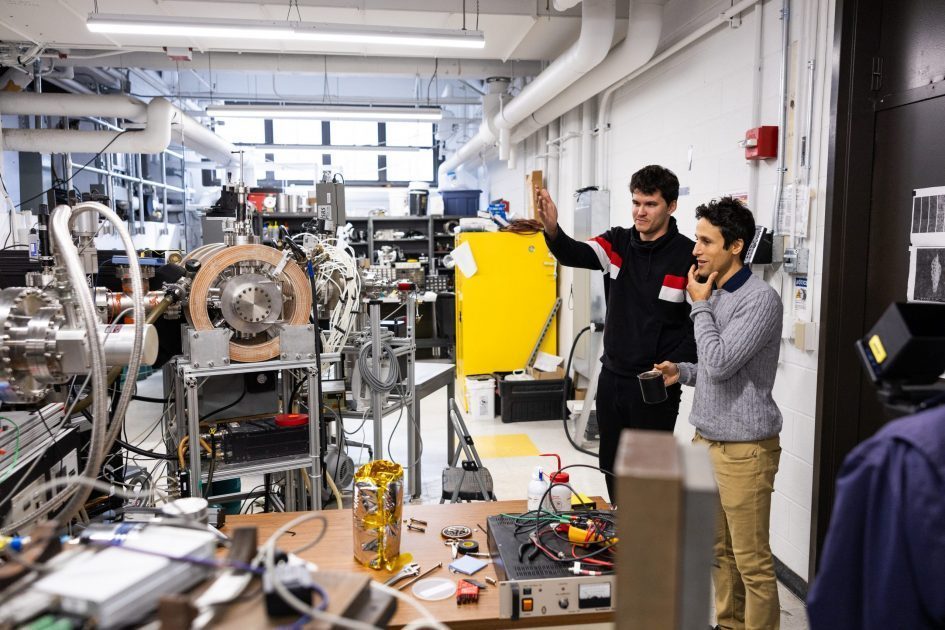
MIT Alumnus Cohen-Tanugi Named Venture Builder for Proto Ventures
The MIT entrepreneur is partnering with the PSFC to launch new clean energy startups.
By Jennifer Bonniwell | Proto Ventures News
December 23, 2023
David Cohen-Tanugi will lead efforts to create and launch clean energy startups out of MIT labs as the new venture builder for MIT’s venture studio, Proto Ventures.
“A venture studio is kind of a startup factory, and the venture builder is the secret sauce,” Proto Ventures Managing Director Gene Keselman said. “Rather than waiting for ideas to be pitched, the venture builder starts by looking for big, global problems and identifies the technologies within MIT labs to solve those problems.”
As a venture builder and subject expert with scientific and entrepreneurial experience, Cohen-Tanugi is tasked with spending the next two years embedded in MIT labs to identify, build, and launch startups for Proto Ventures.
Proto Ventures launched in October 2019 under the MIT Innovation Initiative (now the MIT Office of Innovation). Proto Ventures is the first-ever venture studio of this kind within a university. Proto Ventures is modeled after private-sector venture studios like Cambridge, Mass.-based Flagship Pioneering, which founded Moderna among other companies. Venture studios create startups by seeking out research to solve pressing market needs and shepherd those ideas to market.
“At the core of the venture builder’s role is the goal of getting more happening in MIT labs by being the translation catalyst,” said Cohen-Tanugi, who has more than a decade of experience in technology development and commercialization. He is the co-founder of Embr Labs, an MIT spinout that commercialized the “personal thermostat”. He holds a PhD from MIT’s Department of Materials Science & Engineering, where his doctoral research on water desalination using nanoporous graphene earned him a Forbes 30 Under 30 award. Cohen-Tanugi also was named one of MIT Technology Review’s Innovators Under 35 France.
Cohen-Tanugi will lead the Clean Energy & Fusion Channel, which Proto Ventures launched in early 2023 in partnership with the MIT Plasma Science and Fusion Center (PSFC). “I’ll be able to connect labs that might not have talked to each other, engage researchers who might not have thought about tech translation, and ultimately create ventures that might not have come into being otherwise,” he said.
How it Works
Proto Ventures differs from private-sector venture studios like Flagship because it allows for greater engagement from MIT researchers given that Proto Ventures is an internal MIT program. Proto Ventures also doesn’t take equity in ventures launched from the program. Its mission is not for profit but to maximize the real-world impact of MIT and catalyze more translational research activity across the Institute. In other words, Proto Ventures seeks out problems that would have the greatest impact on humankind, then creates commercial solutions to those problems from within MIT labs.
The Proto Ventures model is to hire a venture builder to embed inside MIT labs and engage translation-minded researchers to form teams around potential ventures. The venture builder guides the process from creation of business plans, customer discovery, and de-risking. The process ends with the launch of successful spinoffs that raise funds from venture capital firms, government grants, and other early-stage capital sources.
Partnering with PSFC
The inspiration for the Clean Energy & Fusion Channel sprouted in part from the success of another big swing-for-the-fences venture that spun out of the PSFC: Commonwealth Fusion Systems (CFS), a fusion energy company that still holds the record for the most Series B funding ($1.8B) ever raised in Massachusetts. The idea for CFS’s groundbreaking technology initially arose from a class project investigating smaller, more powerful fusion device magnets in a PFSC fusion design class taught by MIT Professor Dennis Whyte, director of the PSFC who stepped down at the end of 2023. Whyte, his former students, and an MIT postdoc went on to found CFS in 2016. The ability to make much stronger magnets that also were smaller opened the door to the possibility of scalable commercial fusion power plants.
In light of the success of CFS and the PSFC’s extensive research portfolio, Whyte wondered if there were other big problems that MIT could turn its attention to – and not just in fusion, but in clean energy as a whole. “The launch of a single company, no matter how successful, is insufficient,” said Whyte, who also is the faculty director of Proto Ventures. “We should be doing something more purposeful about venture creation at PSFC.”
It was Whyte’s curiosity and Keselman’s vision that led to the launch of the Clean Energy & Fusion Channel and the return of Cohen-Tanugi to MIT.
Recent Comments